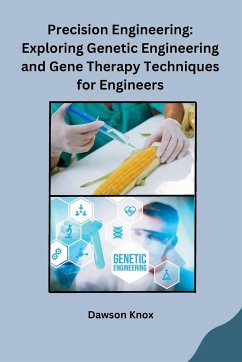
The Student's Guide to Genetic Engineering Breakthroughs
Versandkostenfrei!
Versandfertig in 1-2 Wochen
24,99 €
inkl. MwSt.

PAYBACK Punkte
12 °P sammeln!
In the world of biotechnology, one term that frequently comes up is genetic engineering. But what exactly does it mean? Genetic engineering refers to the process of manipulating an organism's genetic material to alter its characteristics. This innovative field has revolutionized the way we approach various aspects of life, including medicine, agriculture, and industry. Genetic engineering involves making changes to an organism's DNA, the genetic code that determines its traits and functions. Scientists can insert, delete, or modify specific genes to achieve desired outcomes. This process is ca...
In the world of biotechnology, one term that frequently comes up is genetic engineering. But what exactly does it mean? Genetic engineering refers to the process of manipulating an organism's genetic material to alter its characteristics. This innovative field has revolutionized the way we approach various aspects of life, including medicine, agriculture, and industry. Genetic engineering involves making changes to an organism's DNA, the genetic code that determines its traits and functions. Scientists can insert, delete, or modify specific genes to achieve desired outcomes. This process is carried out in laboratories using advanced tools and techniques. One of the most significant applications of genetic engineering is in medicine. Scientists have been able to develop genetically modified organisms (GMOs) that produce valuable pharmaceuticals. For example, insulin, a hormone used by people with diabetes, is now produced by genetically engineered bacteria. This breakthrough has ensured a steady supply of this life-saving medication. Genetic engineering has also revolutionized agriculture. By manipulating the genes of crops, scientists have created genetically modified plants that exhibit enhanced traits such as increased yield, resistance to pests and diseases, and tolerance to environmental conditions. These genetically modified crops have played a crucial role in addressing food security challenges and reducing the use of harmful pesticides. Furthermore, genetic engineering has opened up possibilities in industrial applications. Enzymes produced by genetically engineered microorganisms are used in various industries, such as the production of biofuels, bioplastics, and detergents. These advancements have paved the way for more sustainable and eco-friendly alternatives to traditional manufacturing processes. However, genetic engineering is not without controversy. Some argue that manipulating the genetic makeup of organisms raises ethical concerns and poses potential risks to the environment and human health. It is essential for students studying biotechnology to understand and engage in ethical discussions surrounding this field.














